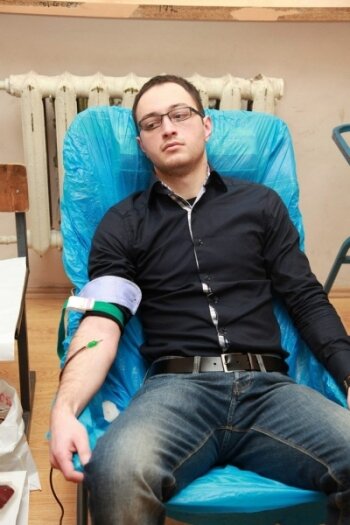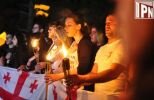 Charity that showed a considerable mobilization of donors
Charity that showed a considerable mobilization of donorsRecently, with the mediation of Georgia Red Cross Society, Ilia University became a venue for voluntary blood donation. There are several special days, including the World Aids Day, International Volunteers Day and World Blood Donors Day, on which such charities are always conducted. However, it was a happy coincidence, when the wish to help the children ill with leukemia, came in accordance with the quantity of volunteers, which made it possible to hold the charity event.
“My Senior Friend” is the joint project of UN Association of Georgia and Ministry of Justice. Anna Buyanova is the coordinator and initiator of the charity. “First of all, the idea stemmed from the sorrowful fact - my relative’s child died of leukemia. With this charity, I wanted to underline the importance of such compassion. We wanted to hold it on July 14, World Donation Day, but as there were too many wishers to donate, we chose to do it now. Thanks to the facebook, a lot of people gathered, regions included, and they were so many that we could not even receive all of them. Therefore, we wish to engage all the blood banks in the future to be able to receive all the volunteers. This precedent was already followed by other organizations of public sector. I am happy for this.”
Irma Ebralidze was one of those who donated the blood free of charge. We talked to her: “I have always wanted to donate, but I have not had a chance so far, because you have not to have been at dentist’s, even at nail cosmetologist’s within two months, there was also some age and weight restrictions. I am happy that at last, I have become a donor. Now I know that I can do it every once in a two months and save somebody’s life.“
Georgia Red Cross Society was the mediator between the blood banks and volunteers. “GRCS, as member of the IFRC (International Federation of Red Cross and Red Crescent Societies) and like many other National Societies, is promoting voluntary, non-remunerated blood donation. We are conducting activities from 2009 with the support of Norwegian Red Cross. Through raising awareness of youth at the age 18-30 about blood born diseases, safe blood donation and importance of voluntary non-remunerated blood donation and recruiting of potential blood donors countrywide the GRCS plays the critical role as auxiliaries to the government,” Ketevan Mindeli, Coordinator of the HealthCare Program of the GRCS commented.
“The viability of a country’s blood service rests with its government and its commitment to safer blood must start with the development and implementation of a National Blood Policy which enshrines the principles of 100 per cent voluntary blood donation as the cornerstone of a safe and sustainable blood service,“ Ms. Mindeli adds.
Davit Loliashvili, Director of the Blood Bank located at Iashvili Hospital and who was involved in the particular charity, says that there are some signs of animation in regard of information and education of people that must be attributed to quite an active recent media campaign. “The only problem is attracting donors and the lack of information, but things are improving and let’s hope that this wave of activeness in the press will not be ended. This is like being an Orthodox Christian and forgetting to go to a Church, Fast, etc. It is all about remembering that we could save other’s lives. I can tell you that in our blood bank, January month showed a record – almost 1000 people donated.”
So far, Georgians tend to donate when there is the most extreme situation – war, etc. Otherwise, they donate when their close relatives are in danger. Let’s hope that a famous slogan “Donate and Save Lives of others” will really work. P.S: According to the law, the age of potential donors is defined from 18 to 60. Everyone who is healthy and does not have temperature or cold, does not receive any antibiotics, is not pregnant or breast-feeder, has not received alcohol for the last two days and has not made any medical manipulation and does not weigh less than 55 kg, is eligible to apply for the donation. They should not be hungry while donating. Of course, testing for AIDS, B and C hepatitis and syphilis is obligatory and anonymous. All foreigners are welcome to participate.





















































